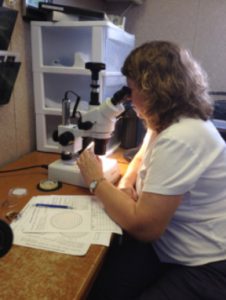The Soil and Water Sciences Department is offering students the chance to blog about their summer experience. The students enrolled in one of three courses over the summer, for which they received credit: SWS 4905-Individual Work, SWS 4911-Supervised Research in Soil and Water Science, and SWS 4941
Practical Work Experience. This is Donna Kaminski’s summer internship:

(photo by Samantha Smith, FOS)
My name is Donna Kaminski, and I earned my BS in Environmental Management in Agriculture and Natural Resources this summer. I worked at the UF/IFAS Extension office in Martin County as a Sea Grant intern under the supervision of Dr. Vincent Encomio. Dr. Encomio is the Sea Grant agent in Martin/St. Lucie Counties and has many responsibilities in the coastal areas such as water quality, coastal habitat restoration, and living shoreline, marine science education, restoration aquaculture, and community science.
Cyanobacteria & Microplastics
My tasks as a Sea Grant intern are ongoing. I was part of the initial stage of cyanobacteria research under the principal scientist of Dr. Dail Laughinghouse, the UF researcher in Davie, Florida. Strategic sites were chosen to collect water samples and data for cyanobacteria diversity and genetics. I assisted in data gathering of the four sites by using the Van Dorn sampler and the Secchi disk. I have designed a dog safety fact sheet regarding when a dog is exposed to cyanobacteria’s toxins. In 2018, eight dogs had signs of cyanotoxins, and one dog died. Veterinarians are reviewing the fact sheet for possible revisions before the UF design department finalizes it for public use.
Another task was the Microplastics Awareness Project. I collected water samples in two sites in Stuart and filtered the water. After the microplastics identifying training class, I reviewed the filters by the use of a dissecting microscope. I found a few fibers in the filtered disks. This means there are microplastics in the coastal area!
Learning Experience
I learned a lot from Dr. Encomio and being a Sea Grant intern was a great learning experience. I have introduced various organizations to work on the Florida coastal ecosystems: Florida Oceanographic Society, Florida Health, and Florida’s DEP Indian River Lagoon Aquatic Preserves. The mangroves are a big part of Living Shoreline, which I learned while talking to a research scientist at the Florida Oceanographic Society and read his three journals.
My technical skills, such as water sampling, prepared me to work as a Sea Grant intern. Also, I discussed water quality issues with residents of Stuart while I was performing fieldwork. I think informal outreach is critical in telling the public about the research in Florida’s coastal areas.
I am sad to leave as a Sea Grant Intern because of the continual projects in water quality and wildlife habitats restoration. I have always loved nature and enjoy the recreational activities that South Florida has to offer. Ecological issues have always been my concern, and that is why I earned a degree in Environmental Management. It is my goal to educate myself with Florida’s ecosystem by reviewing those in South Florida. Once I secure a career in environmental management, I am planning to earn a masters degree in Environmental Science.
 0
0
